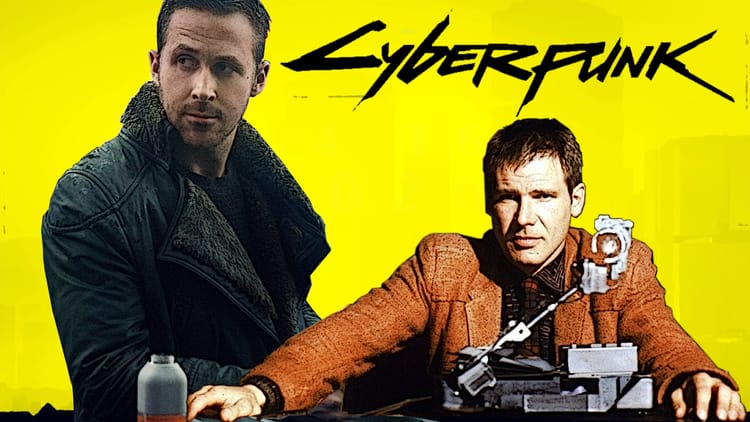In Defense of Machines

“Surrender or rebellion; sacrifice or conquest; death of the self or triumph of the will; the Cross or the machine. We have always been offered the same choice.”
So wrote Paul Kingsnorth about his ecologically and spiritually driven conversion to Orthodox Christianity from Wicca.
I have been thinking about this antipathy between machine and the Cross for a while now (as is evident by much of what I’ve written on this site). There does, often, seem to be something like that. One might feel like the retreat of one will necessarily lead to the ascendancy of the other—intuitively, at least.
For Kingsnorth, the problem of our mistreatment of the earth, the environment, and humanity is a spiritual one. It manifests itself in ecological terms but that is the outward expression of what is actually a spiritual dereliction and deficiency. Philip Sherrard, who I’ve long admired and have studied very intently, made a similar diagnosis. Since both Kingsnorth and Sherrard are Orthodox, maybe this is not too surprising (and both, in addition, drew off of a lot of esotericism as well).
But, in truth, I’m wary of going too far in this direction.
I had actually been thinking, for some time, of writing something in favor of machines on this site. Much of my recent articles have bemoaned them. Or, at least, bemoaned the way that our global economic system is eroding the planet and destroying our attention spans and interfering with our daily lives. I do believe this is true, but it’s only one side of the story. And I don’t think it would be honest to consistently harp on the negatives of machines without giving them their due as well, and thinking through what our relationship with them might be like if it were more positive and humanistic.
In short, what is the difference between machines and The Machine™? Is there one? Can we have one and not the other?
A Family Fascination

A certain amount of familial determinism can be blamed for this inconsistent duality in my own thinking.
From my dad I’ve inherited a good deal of devotion and dedication to the California wilderness—from the Owens Valley and the Eastern Sierra to the San Bernardino mountains. I’ve never been much of a hiker, but, even though I do it only occasionally, I nevertheless want nothing more than to protect these places. I was, after all, brought up to revere John Muir as the patron of Californian nature piety.
On my other’s side, I also have the Greek connection, specifically through my grandmother. And her family, in Greece, still lives in rustic villages and tend to their farms: their goats, their olive groves, their bees. It’s easy to romanticize this kind of life, to adopt a kind of Virgilian interest in rural Greece as a preternatural haven from the ravages of the world at large.
But it is in reality a frequently hard and impoverished life, and not one most of us would willingly take up, even if we might periodically enjoy cosplaying as Arcadian peasants from time to time. There is a reason my ancestors left.
On the other hand, I’ve also inherited an enthusiasm and passion for machinery and especially computers from my maternal grandfather, who married into my Greek family and converted to Orthodoxy to do so, but whose true dedication in life was to engineering, programming, and mobile phone technology.
I recently saw the movie First Man, about Neil Armstrong. In the opening five-minute sequence, Armstrong (played by Ryan Gosling) undergoes a harrowing flight inside the X-15, an experimental aircraft that still holds the record for the fastest manned flight. This manned rocket could not even take off on its own, so it had to be dropped from a larger plane already in-flight, with a single, death-defying pilot strapped inside as it blasted off into the upper limits of the atmosphere.
The opening scene from First Man where Neil Armstrong flies the X-15.
The X-15 holds a special place in family lore, because my grandfather helped build it.
Ray White was a technician for NASA at the time, having helped with the planning of the X-15’s fuel system. I recall one time at a lunch at Coco’s where he explained to me how complicated all the engineering was—but given that I was around 13 years old I did not understand any of it (and still probably wouldn’t).
In one particularly notable episode, he was onsite when the X-15 #2 crash landed in Mud Lake, Nevada. After the pilot, Jack McKay, plowed into the aircraft into the ground (when he had to make an emergency landing and the skid collapsed), Ray arrived in a jeep when the C-130 that had carried the X-15 landed. McKay was pulled from the wreckage, and as Ray explained it to the author Michelle Evans in her book The X-15 Rocket Plane:
I noticed that the APUs [auxiliary power units] were still running, [and] here’s the airplane sitting upside down. So, I crawled up under there, and it was a little confusing for a second, but I turned the switches off to shut down the APUs. Engineering said that if they’d have run another thirty seconds, they would have blown up.
A possible disaster had been averted. Ray was always very proud of his work on the X-15, as well as other aviation engineering projects he worked on, like the F-86 Sabrejet.

But he was most passionate about computers, and he passed on that interest to me as a kid. We were early adopters (rather surprisingly) of home PCs, possessing one that ran MS-DOS back in the early 90s and connecting to the internet by the mid-90s, when it was only just barely spreading through American culture. I used it primarily to research praying mantises. In the early 2000s, Ray showed me how to build a PC at home with the assembled parts (drawn from his favorite store, Fry’s Electronics). I could then run Halo: Combat Evolved at the highest possible settings.
I think much of my interest in technology, machinery, and its relation to religion, can be sourced in this sort of duality and divergent family experience. But from my grandfather I have been bequeathed an interest in technology that also gave rise to my own personal fascination with video games and science fiction.
The Good of Technology

It was as I was mulling over these thoughts that the new Plough Magazine issue was published. Their summer issue on “The Good of Tech” arrived in my mailbox right as I was outlining this piece.
Peter Mommsen’s opening editorial, “The Artificial Pancreas,” poses the question: “how can we live well with technology?”
Much of the article revolves around a friend of Mommsen’s young son, who lost his phone in a swimming pool while they were all playing. But this phone was important for more than the usual reasons: it was part of the boy’s treatment system for type-1 diabetes. They fortunately found it, and Mommsen relates, “This is a happy story about the good of technology, the kind that can transform a kid’s life. It’s a technophile parable in which an artificial system that combines mobile software and automated hardware literally plugs into a human body, helping it to thrive in a way it wouldn’t if left to nature.”
I think we all would have similar stories. Since I have asthma, I do not want to go back to a world without albuterol inhalers. My dad, who also has asthma, told me about how in the 1960s he’d have to just sit through an attack and wait for the wheezing to subside.

Probably you can think of an example like this too.
Medicine, though, is an easy topic. Critics of technology (myself included) have sometimes tended to draw a line around it. “That tidy distinction breaks down in practice,” writes Mommsen. We all know that smartphones are behind a lot of the negative social trends we’ve observed the past twenty years. But it is a smartphone, and not a lone piece of medical equipment, that makes this artificial pancreas not only possible but easy to use. And the very structure of Artificial Intelligence, which makes it often inaccurate and data hungry, is also what makes it very useful in medical research.
Technology is ecological, Mommsen suggests. We have to recognize that many instances of it come in both good and bad.
But, crucially, that does not mean that technology is neutral—this is a lie promoted often by malefactors and profit-seekers who intend to justify their research into dangerous things.
Neil Postman long sounded the alarm about this—every technology has an agenda. The issue is, we must study each technology closely to see what its agenda is, and what the unforeseen consequences of its agenda might be.
Social media is a good case in point. There was a time when, during the Arab Spring, many around the world thought that Facebook and Twitter were tools of the people, necessary aids in democratic uprisings against tyranny. But, over a decade later, the autocrats have figured out a way to use social media against us with widespread disinformation campaigns, using social media as the bedrock for a “post-truth” ecosystem which breeds cynicism and despair, two critical tools for the maintenance of antidemocratic power.

But even the story of social media is still not all terrible (even if it mostly is). It was through the justifiably maligned Facebook that my family managed to reconnect with our cousins and relatives in Greece, with whom we’d lost touch in the near-century after my grandmother’s family immigrated to the United States. And now, because of that, we have gone to see them in Greece a few times. Smartphones there, too, are useful, both in terms of providing accurate maps of the rural countryside and its impossibly small roads, but also because many of our family members there do not speak English, and so Google Translate is invaluable (even though I’m slowly improving on my rather Tarzan-like modern Greek). It would be difficult and devastating to give such things up.
For Mommsen, one strategy is to double-down on the thing that technology advertises but often fails to provide: community. And Plough, coming from the Bruderhof, has its own spin on that. But what about the rest of us who live in cities and apartments and suburbs?
I’m not fully sure. But I do know there’s one thing we shouldn’t do.
We (Don't) Have to Go Back

One reason I find Lewis Mumford to be one of the most sagacious technology critics is that he avoided the easy, reactionary take that things were “better in the old days.”
This is a tempting attitude but it’s not one borne out by history. Focusing on going back can sound nice in theory, but it can also be a roadmap for political repression and authoritarianism. In some circles, irritation and anger at technology can even lead to a kind of eco-fascism. There’s a certain darkness there, which crops in anti-modern, dark romantic, and even neo-pagan ideologies, which bemoan capitalism, which is tempting, but also modernity and liberalism—the elimination of which often leads to untold horrors.
Moreover, many of the things we recognize as uniquely modern besetting sins are in fact old and even timeless.
Kingsnorth wrote, for instance, that “modern economies thrive by encouraging ever-increasing consumption of harmful junk, and our hyper-liberal culture encourages us to satiate any and all of our appetites in our pursuit of happiness.”
One could say the same thing about the Roman Empire, minus the “hyper-liberal” adjective. One needs only read the ancient Stoics from the Imperial period to see intellectuals castigating the masses for “satisfying all of our appetites in our pursuit of happiness.” Granted, the Greek philosophical terms they used like “flourishing” instead of “happiness” can sometimes sound different, but diagnosis of the sickness is as old as the hills. Their solutions, and the solutions of most Greek philosophers, of rational temperance of passions can, similarly, sound foreign to us, but in practice they feel familiar.
Does technology make it worse? I think so, in a lot of ways. But it doesn’t make it new.

Mumford, instead, was emphatic on the ancient age of the “megamachine.” And this is why I hold that the term megamachine is far superior to the vague gesticulations about The Machine™ or “machine society” or “machine civilization” that comprise the lamentations of most technology critics.
For Mumford, the megamachine was a specific kind of entity grounded in a historical time period; it is a totalizing and all-encompassing web of society and bureaucracy that is all fused together so that it militates against individuality and agency in the world. But, critically, the “megamachine” is not new technology, and it is not a “machine” in the sense we tend to think of them—as devices of metal and screws and integrated circuits. The megamachine is old. It is, in fact, ancient—perhaps one of the oldest things that exists. And it is a machine composed not of earth’s metals but of human parts.
The first megamachines, according to Mumford, arose in the bronze age. As he chronicles in The Myth of the Machine, it was the crucial foundation to Mycenaean, Babylonian, and especially Egyptian civilization—massive bureaucracies, ruthlessly administered on the backs of slave labor, with their tendrils of their centralized economies reaching out into land around them. It depended on newfangled inventions like ledgers, writing systems, and accounting. Such things are technology, too, even though we tend to think that all technology must be powered by electricity.
The most iconic achievements of the ancient megamachine were the pyramids—huge building projects manufactured entirely for the glory of some of history’s most authoritarian figures. The enormous interlocking of slave labor and bureaucratic management that made them possible constituted the very essence of the megamachine. The machine mindset, such as it exists and is bewailed by the prophets of today, was in full effect three thousand years ago.
Those Who Fought the Megamachine

The point here is the struggle against dehumanizing machinery and technology is not unique to the modern period, even if it feels sometimes like we are laboring under uniquely horrible circumstances.
Of course, many of the fears are true. Widespread surveillance and policing are possible on a scale now that was simply unimaginable in the world before the 20th and even the 21st century.
But the basis of the problem, of the crushing of the human spirit by the megamachine, is sadly not a problem only we moderns have had to endure. Importantly, though, this does mean the past does offer some solutions.
Mumford read the Exodus in the Old Testament as a story of resistance against the megamachine. It’s the story of a subjugated people’s rebellion against slave labor—against the pyramids, in a word—and so therefore against the very symbol of the megamachine. They refused to be a part of this vast network of human parts, to be crushed by the gears of the system. And so, they fled into the desert.
Importantly, Mumford read many of the Levitical and Deuterocanonical laws in the Bible as anti-megamachine laws. Think of how significant something like the Sabbath would be to those who labored under the iron fist of the megamachine. Or laws mandating debt relief and the freeing of slaves and the welcoming of immigrants and refugees.
Remember the Sabbath

It is here that we can find some methods and tactics to resist the megamachine today, which, as Mumford pointed out, returned to existence in the modern period and now seemingly spans the whole globe. Now, then, some of these old ideas are needed.
(And isn’t it telling, when you think about it, that when calls for “biblical morality” are shrieked in the public sphere, no one blathering such pother is concerned about the fourth commandment? “Remember the Sabbath day, to keep it holy.” Why does no one care that this one is violated every week?)
To tie this back into the beginning of this post, it is critical to think about technology and machinery in a more nuanced way. What purpose do technologies serve, what telos do they have? Because if there are ways that our technology can assist in human flourishing, can make it easier to live more human lives—by say, I don’t know, adhering to the fourth commandment—then these are goods that need to be maintained.
To live well with technology, we must always think teleologically, and we cannot make easy judgments about it being wholly good or evil, nor wholly neutral. Nothing is ever so easy. But doing so will help us also recall all the good things machines can and have done for us.
And so the question to think moving forward is: can machines be enlisted to help resist the megamachine? What would that look like?
It might vary from technology to technology. But the question should always be asked. What does this particular machine, this particular tech, do to human life? Does it improve it? Does it make it worse? How might we wisely and carefully employ technologies (like AI) that seem to do both at once?
Asking these questions also reminds us that it is the megamachine that is the real enemy, and not necessarily the machines themselves.





Member discussion